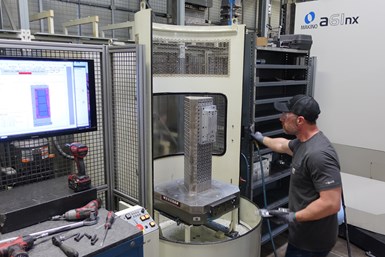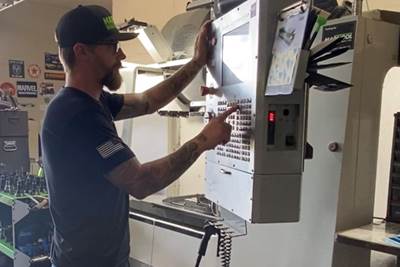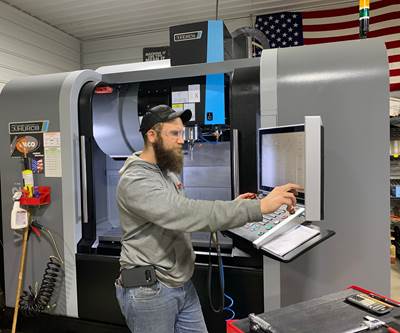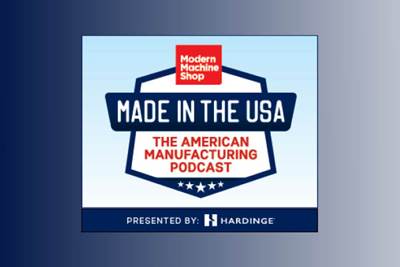Challenges Reveal Value and Vulnerability of Small Machine Shops
Small business ownership is conducive to the kind of oversight and commitment that serves machining well, but small business also relies on the support and commitment of enterprises around them.
Share





I want to say some things about smallness. As in, small machine shops — the power of this type of business, and the vulnerability.
In the U.S., many if not most machined parts are produced by small shops. The actual volume of parts is hard to tally, but certainly most shops themselves are small. Census Bureau data say facilities with 19 employees or fewer represent 82% of businesses classified as “machine shops.”
Two experiences of late have reminded me how the work of these small manufacturers plays out, what their prevalence means and what they need.
I recently visited a small shop (under 20 employees) that has seen its business collapse with the decline in commercial aircraft activity. The Boeing 737 MAX debacle was bad enough; then came the cutbacks of the airlines that resulted from the pandemic. At the lowest moment, this machine shop that serves aircraft customers had only one active job running in the shop, occupying just one of its several high-end CNC machines.
Other bigger and better-known manufacturers in the aircraft industry also suffered from the declines in this sector. Some of these companies immediately responded by cutting headcount. This small shop did not; its owner kept everyone on the payroll.
Now, I cannot see into this owner’s soul. I do not know his motives. I credit that he is a man of compassion and loyalty. Meanwhile, I suspect he also knows how hard it is to find manufacturing talent, and how badly the shop might need these employees when business returns. However, even this latter motive says something important, because it illustrates how manufacturing benefits from ownership.

Small shops and larger manufacturers have differed in their responses to business declines resulting from the drop in commercial aircraft work. This photo was taken at Trinity Precision, a shop serving the aircraft sector that we visited for this story back before the recent difficulties in the aircraft sector began.
Senior editor Brent Donaldson and I have been producing a podcast, Modern Machine Shop’s “Made in the USA.” In it, we evaluate choices made in manufacturing in recent decades, including choices that arguably have not served the nation well. One of the unfortunate turns came perhaps several decades ago, with a shift toward taking a shorter-term view of the costs and potential returns of businesses invested in manufacturing. In important ways, a manufacturing facility, particularly a machine shop, is not like other types of businesses. There is considerable capital equipment involved, along with the need to develop systems and knowledge around the use of that equipment. It is fitting, therefore, that the companies accounting for a large share of U.S. machining now are small businesses. The small business owner — I am stressing that word — is the type of facility leader that can best steward the enterprise with the kind of long-term consistency that leads toward doing manufacturing efficiently and well.
For that small shop I mentioned that kept its employees on the payroll, some good news: At this writing, commercial aircraft manufacturing has not yet rebounded, but the shop’s business is starting to. Larger companies nearby cut headcount too much for the increasing work they’re now seeing. The shop is getting some business resulting from these firms’ outsourcing.
From there, another anecdote, also anonymous — this one about the vulnerability of small shops. I have been following the frustrations of a shop that has been saddled with a damaged piece of equipment. An innocent mistake by a visiting service technician resulted in the damage. Since then, the shop owner has faced what he reasonably views as one inadequate response after another from the equipment’s supplier.
The shop owner sees two challenges at the root of the travails. First, he is small. His little shop does not appear to promise large potential business in future orders, not compared to larger facilities that he suspects get more of the supplier’s attention. Second, he is small. Running the shop leaves him so busy, he cannot find time to be the kind of squeaky wheel that might command more of the company’s energy in addressing the problem.
Which brings me to this observation: It is not hard to appreciate and admire small businesses. But in addition to acknowledging their importance, let us also appreciate the companies that serve them well.
I have written about how the distinction in shop sizes is intensifying. Larger shops are getting larger still through acquisition, while small shops are seemingly getting smaller as advances in technology let very small shops do more. In visiting or communicating with some of these very small manufacturing firms, including one-person shops, a recurring theme I encounter is the gratitude they are apt to express for the local machine tool sales agent who has been a valuable source to them for guidance, and even for business connections.
Those kinds of relationships are another example of the long view. Small, independently owned manufacturing businesses can do great work because of the steady attention they can give to investing in capability and expertise. Yet those small manufacturers are greatly helped in turn by a country, by a community and by a network of professionals around them that see the work they are doing and see past the smallness to understand the role these shops play, and what they are working to become. Those of us who know machining appreciate the small shops. But those who run small shops know who their allies are, and they appreciate those supporters just as deeply.
Related Content
Sandvik Coromant Inserts Provide Stable Turning of Aerospace Components
The new insert grades GC1205 and GC1210 cover a large application area within last-stage machining and intermediate-stage machining when turning aerospace engine components.
Read MoreArch Cutting Tools Acquires Custom Carbide Cutter Inc.
The acquisition adds Custom Carbide Cutter’s experience with specialty carbide micro tools and high-performance burrs to Arch Cutting Tool’s portfolio.
Read MoreShop Tour Video: From Garage Shop to Leading Aerospace Supplier
From repairing aircraft interiors to manufacturing medical implants, Superior Joining Technologies excels at CNC machining, TIG welding, laser welding, and NADCAP-accredited nondestructive testing. Discover how this Rockford-based company supports the aerospace industry through a combination of advanced technologies.
Read MoreHow to Meet Aerospace’s Material Challenges and More at IMTS
Succeeding in aerospace manufacturing requires high-performing processes paired with high-performance machine tools. IMTS can help you find both.
Read MoreRead Next
Machining Suppliers of the Future Will Be Both Bigger and Smaller
When we look for Top Shops in the years to come, what will we find? Through acquisition they’ll scale up and with technology they’ll scale down.
Read More5 Hard Lessons from a 28-Year-Old Startup Machine Shop Owner
Good fortune and years of long working hours have both figured into the success of this young shop, which became its founder’s sole employment starting last year. The shop owner shares his story.
Read MoreMade in the USA- Season 1 Episode 1: How We Got Here
Episode 1 of Made in the USA Podcast examines manufacturing issues related to trade policy, global supply chains, education, automation and our ability to produce skilled workers.
Read More






























.jpg;maxWidth=970;quality=90)